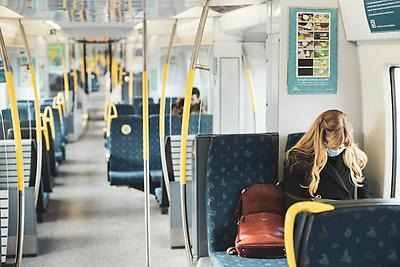Everyday life
On the following page, you you can read about everyday life in Sweden, for example in which shops you can buy what you need, how recycling works and which leisure activities you can engage in.
Summary
- Learning Swedish will help you complete your education, to find a job and make friends. There are language courses at different levels.
- Many services in Sweden are digital. It is therefore important to learn to use smartphones and computers.
- It is important that you take care of your physical and mental health. If you have a health condition that requires medical treatment, you can make an appointment to visit a doctor's office.
- Use some of your free time to participate in different activities and interests. This is a good way to get to know other people and to practice the Swedish language.
- It is easy, safe and inexpensive to travel by public transportation in Sweden, and many use it for their daily commute to work and school.
- You must be 18 years old and have a valid driving license to drive a car in Sweden. Seat belts are mandatory for everyone. Car seats are mandatory for smaller children.
- Food, clothing and furniture are often bought in indoor shops or shopping malls, which are usually found in the larger cities.
- In Sweden, recycling is considered an important part of the work to protect the environment. Therefore, you need to recycle items like food waste, plastic, metal and glass.
The importance of learning Swedish
Since you are moving to Sweden, you need to learn Swedish. Swedish is the official language and is spoken everywhere. Learning Swedish as soon as you arrive will help you integrate (fit in). Understanding and speaking Swedish will help you find work, receive education and training, gain access to various public services and to get to know people. As a newly arrived person in Sweden, you will study Swedish as part of the establishment program. In addition, there are many digital tools that you can take advantage of, as well as so called language cafés, where you can practice.
A digital society
Sweden as a society is becoming increasingly dependent on digital technology. The use of technology can be found everywhere; at school, in the workplace and during leisure time. Most occupations require basic computer skills. In many Swedish families, children have their own smartphones or laptops. Adults use smartphones to pay bills, access banking services, book various appointments, buy tickets and for electronic identification. Learning to use digital services is important to adapt to everyday life in Sweden.
You use the Internet to search for information. It is important that you use reliable sources, such as official government websites, since there is a lot of false and misleading information and rumors circulating in social media and on the internet. If you do not have a computer or an internet connection, you can go to the public library and use a computer without any cost. In some public places, you can also use the internet without charge, by connecting your smartphone or laptop.
If you need support in how to use digital aids or various digital services, libraries, voluntary organizations or the municipality can usually offer help or introductory courses.

Taking care of your health
Moving to a new country involves many changes and challenges. It may also mean that you need to change your lifestyle. To make sure that you feel well, it is important to take care of your physical and mental health. There are things you can do to increase your well-being, such as getting enough sleep, eating healthy and exercising.
If you have a health condition that requires medical treatment, you can make an appointment to visit a doctor's office. The doctor can prescribe medications or other treatment.
Leisure activities
Leisure activities give you an opportunity to pursue your interests, get to know people, and participate in society. It also provides an opportunity to practice the Swedish language.
You can participate in most leisure activities regardless of age and gender. There are activities that are intended for a certain age group or a certain gender, for example different study circles for pensioners or swimming for women. Leisure activities for children are adapted to different age groups.
The availability of leisure activities varies in different municipalities. Some activities are free while others may cost money. You can visit most public places without any cost. These can be, for example, football facilities, outdoor gyms, skate areas as well as green areas and parks, where many people hang out in their spare time or exercise.
Transportation
Traveling by public transportation, for example by bus, train or subway, is common in Sweden and many people do it every day to get to work or school. Public transportation is safe, easy and more affordable than traveling with your own car. Buses or trains link all towns, and in the slightly larger cities, there is a train, tram or subway.
You need to buy tickets for public transportation before boarding. You can buy tickets in smaller shops or ticket machines in connection to public transportation. Often, you can also buy a ticket through an app on your smart phone. Note that you will be fined if you travel without a ticket.
Travel by bicycle
For shorter distance travel, a bicycle is a common means of transportation in Sweden. In cities, there are assigned bicycle lanes.
You need to know the rules that apply in traffic, for example that you drive on the right side of the road (right-hand traffic). By law, the bicycle must have lights and reflectors when it is dark. For safety reasons, children under the age of 15 are required to wear a helmet, but it is important for everyone.
It is important to use reflectors so that you can be seen when it is dark and to be careful when the roads are frozen and slippery.
Driving a car
If you want to drive a car in Sweden, you must be at least 18 years old and have a valid driving license. Everyone traveling in a vehicle must wear a seat belt, and children shorter than 135 cm must use an approved safety device (baby seat, car seat or booster seat). Children under the age of 4 must have a rear-facing car seat when traveling in a car.
In Sweden, right-hand traffic is the rule, which means that all vehicles drive on the right side in traffic.

Photo: Swedish Migration Agency/Björn Bjarnesjö
Shopping
In Sweden, you usually shop for food in various indoor stores. Smaller stores usually only sell food, while larger stores also sell clothes, electronics and tools.
Grocery stores that specialise in food from other parts of the world are usually found in medium-sized and larger cities. In many larger towns, there are shopping malls with shops selling food, technology, clothes and shoes. Often, you can also find, for example, hairdressers, cafés and restaurants.
%20plattform-fatherhood-8412.jpg)
Photo: Plattform/Scandinav/imagebank.sweden.se
Environment and recycling
In Sweden, everyone is expected to take responsibility for the environment and to live in an environmentally friendly way for a sustainable future.
It is common to reuse material from waste when new material is manufactured. This is called recycling. Most homes have recycling rooms where waste is sorted into different barrels or containers, which are then picked up by a recycling truck. The municipality and the property owner are responsible for making sure that the waste is collected. It is the residents of the building, however, who sort the waste.
For Swedes, recycling is an important environmental issue. In the common recycling room, you will find containers and bins for food waste, glass, paper, cardboard, metal, plastic and electronics. If you live in a home where there is no shared recycling room, you need to bring the waste and sort it at recycling centers.
In Sweden, it is common for materials and goods to be reused, for example by buying used clothes and furniture. There are shops in most places where you can buy and also drop off used items. This is a way to save money and it is also good for the environment.
%20cecilia_larsson_lantz-recycling-1075.jpg)
Photo: Cecilia Lantz/imagebank.sweden.se
Animals and nature
In Sweden, it is common to spend time outside in nature for various activities. Through a law on the right of public access (Allemansrätten) you are allowed to spend time in nature without any special permit. For example, you can walk, run, cycle, ride, ski or camp in nature. However, you may not, for example, stay in someone's yard or walk on cultivated land. You must not litter or destroy anything in nature, and not harm or disturb the wild animals that live there.
There are laws that protect animals, which means that animals must be treated well and protected against unnecessary suffering and disease. Animals have an important place in many people's lives. For example, it is common to have dogs or cats indoors and they are treated as members of the family. Animals also have the right to a good life without physical or mental violence, therefore it is punishable by law to hit or kick an animal, for example.
Topics to discuss
- How many languages can you speak? Do you think your language skills can help you learn Swedish?
- Sweden has a high level of digitization. Have you used digital tools before and what do you think you would need to learn to use digital services?
